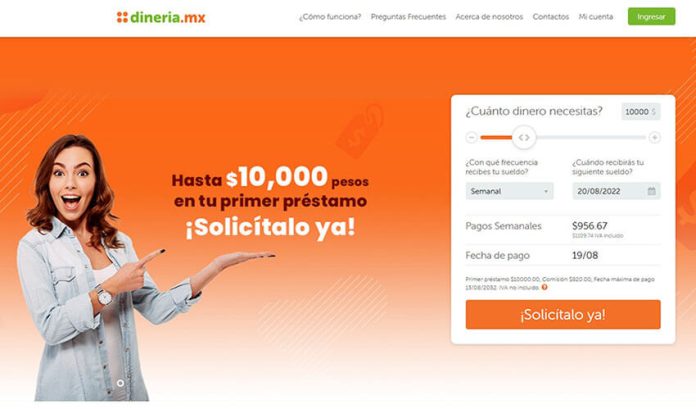A few weeks ago, I received a panicked message from a friend. Was it possible that I had 10,000 pesos (US $500) to lend her, quickly?
The message seemed so out there and uncharacteristic that I decided to call her to make sure someone hadn’t commandeered her phone. Alas, the messages were indeed from her.
What had happened?
She’d apparently fallen victim to a new revenue stream for criminals. We can’t say they’re not creative, I suppose.
Here’s the story: ads are appearing on Facebook, Instagram and other major social media platforms with everyone’s favorite bait: money. According to these “financial apps,” which appear, disappear and change names at the speed of light, you can borrow money without credit bureau checks, which is the normal way one would borrow money here in Mexico through a bank.
As a new business owner, she’d decided to take one up on its offer, sure she could pay it back in the time allotted. It was all downhill from there.
I know at this point some people will say, “Well, that’s stupid of anyone to ask for money if they don’t definitely know how they’ll pay it back.” Fair enough, but I’d invite everyone to think about the times that they’ve been helped out by someone and not been able to pay the person back immediately (to me, the definition of privilege is the ability to make mistakes and miscalculations and not have to pay the worst-case-scenario consequence for them).
There’s also the issue of the legitimate borrowing options available for most middle-class Mexicans: interest rates for loans and credit cards here are so high that they make my eyes cross, and they’re not necessarily easy to access. In fact, I cannot qualify for a credit card here in Mexico because of my lack of credit history in the country.
Actually, that’s not entirely true; I could take an ad up on its offer for a “starter” credit card at — get this — 100% interest to establish my credit. No, thank you!
As inflation rises but wages stay stubbornly in place, we’re all feeling the squeeze. And for those who were already doing badly after the lack of economic support during a very long pandemic in which many people lost their livelihoods, things have been dire indeed.
So, when it came time to pay, my friend was short the full amount. She tried explaining that she’d have it in a few days, and that’s when the problems started.
Apparently, in the “terms and conditions” (you know, the ones that are impossibly too long to read), she’d agreed to share her contact list. Once the app didn’t receive its complete payment, they started sending her threatening messages along the lines of, “How much is your family worth to you? Do you like to ask for money and then not pay it back, rat?”
It went on: “We hope you like broadcasting yourself as much as you like trying to steal money,” because it was prepared to send out messages to all of her contacts about how she “liked to earn her living.”
Oof.
She did end up getting the money together to pay them, sending it to these gangsters by the “deadline” of noon that day. Once she did, she noticed an automatically checked box at the bottom in small lettering: “Yes, I want to receive a recurring loan of 10,000 pesos every month.”
She saw it and unclicked it and thought it was over. As one of her contacts, I still got a message about how she was financially irresponsible — which, as insults go, is not the worst one can receive.
My question is, who are the people behind these types of apps?
My friend seems sure that it’s the same mafia that terrorizes us in other more concrete ways. I’m inclined to agree, as you can only squeeze society so tightly in certain sectors before there’s not much juice left. Once you’ve run a bunch of people out of their homes, after all, what else is there to take from them?
It might also explain why Condusef (Mexico’s agency built to inform and protect users of financial institutions and products) hasn’t shut all these apps down. Not that they’d have the resources to do so anyway; with the speed at which these apps appear and disappear, I imagine it’s a bit like a game of whack-a-mole. Surely, though, they could track down the accounts that all this extorted money is pouring into. My guess is that it’s a much smaller number of accounts than we’d think, given all the different (but similar) names of these apps out there.
Last week, an article came out about how narcos were weaving apologies into their messaging, particularly for the so-called “Culiacanazo” that left 14 dead and many others injured. I’m not quite sure what reaction they’re expecting, but apologies sure don’t seem like much when they continue to terrorize the people of Mexico in so many ways.
After all, asking for forgiveness is meaningless unless you’re going to make an actual effort to stop doing the thing for which you need to be forgiven. Simply switching from one kind of extortion to another doesn’t count as “stopping.”
So, ask Jesus for forgiveness; unless you’re willing to change your ways and stop treating everyone like your personal piggy banks, the rest of us don’t want to hear it.
Be safe out there, everyone – and that includes inside of your phone’s app store.
Sarah DeVries is a writer and translator based in Xalapa, Veracruz. She can be reached through her website, sdevrieswritingandtranslating.com and her Patreon page.
